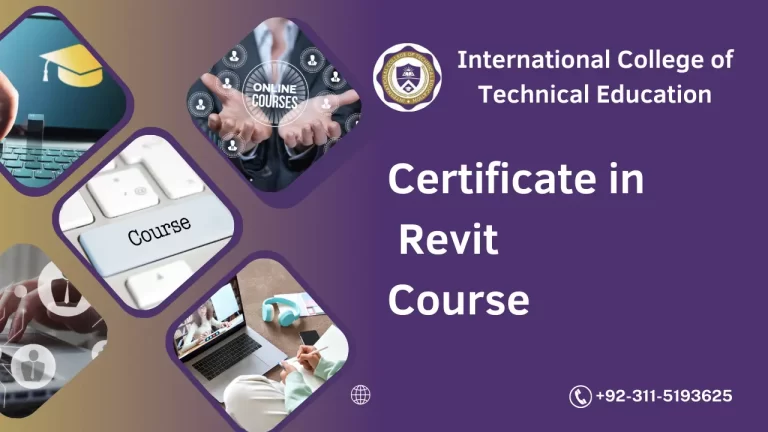Surveying plays a vital role in the construction and civil engineering industries, ensuring that infrastructure projects are accurately planned and executed. From measuring land for new roads and bridges to determining the boundaries of properties, civil surveyors are key players in any development project.
The Civil Surveyor Course in Chakwal is designed to provide students with both theoretical knowledge and hands-on experience in the field of land surveying, focusing on civil engineering projects. The course will introduce participants to essential surveying techniques and the tools used to measure land, distances, and angles. By the end of the course, students will be proficient in using modern surveying instruments and applying the principles of civil surveying to various construction projects.
Whether you’re looking to become a civil surveyor or expand your skills as a construction professional, this course will provide the foundational expertise needed for success in the field.
Course Overview
This course offers an in-depth study of the methods, tools, and techniques used by civil surveyors to measure and map land areas. Students will learn about both traditional and modern surveying practices, such as Total Station, GPS technology, and Geographic Information Systems (GIS). Emphasis is placed on both theoretical understanding and practical fieldwork, preparing students for real-world surveying tasks.
By the end of the course, students will have the knowledge to carry out land surveys for various civil engineering projects, including roads, bridges, buildings, and land subdivisions.
Study Units
The Civil Surveyor Course in Chakwal is structured to provide a comprehensive understanding of civil surveying. The key study units include:
- Introduction to Civil Surveying:
- Basics of surveying and its importance in civil engineering
- Overview of surveying history and its evolution
- Types of surveys (land surveys, topographic surveys, boundary surveys)
- Surveying Instruments and Tools:
- Understanding and using basic surveying tools (tape, compass, level)
- Introduction to advanced instruments (Total Station, theodolite, GPS)
- Calibration and maintenance of surveying instruments
- Measuring Techniques and Data Collection:
- Techniques for measuring distance, angles, and elevation
- Reading and interpreting survey data
- Fieldwork methods and practical survey exercises
- Topographic and Boundary Surveys:
- Conducting topographic surveys to map land features
- Boundary surveying and determining property lines
- Mapping and drawing plans from survey data
- Geodesy and GPS Surveying:
- Understanding geodesy principles and the Earth’s curvature
- Using GPS technology for accurate positioning and mapping
- Introduction to Geographic Information Systems (GIS) for data management
- Surveying for Construction Projects:
- Land surveying for roads, buildings, and infrastructure projects
- Planning and designing civil engineering projects using survey data
- Preparing construction layout plans and elevation profiles
- Data Analysis and Report Preparation:
- Analyzing survey data and creating detailed reports
- Interpreting survey findings for engineering designs
- Presenting survey data in an understandable format for clients and engineers
- Legal Aspects of Surveying and Land Ownership:
- Understanding land ownership and property rights
- Legal considerations in boundary disputes and survey accuracy
- Surveying standards, ethics, and regulations in the industry
Learning Outcomes
Upon completion of the Civil Surveyor Course in Chakwal, students will:
- Be proficient in using modern surveying instruments like Total Station, GPS, and theodolites.
- Understand the principles of surveying and how they apply to civil engineering projects.
- Be able to conduct various types of surveys, including topographic, boundary, and construction layout surveys.
- Develop the skills to interpret survey data and prepare detailed reports for engineers, architects, and construction teams.
- Be familiar with the legal aspects of land surveying, including property boundaries and rights.
- Gain hands-on field experience to ensure they are prepared for real-world surveying tasks.
Course Benefits
The Civil Surveyor Course in Chakwal offers several benefits to students:
- Comprehensive Learning Experience: Students will receive a well-rounded education that covers both theoretical concepts and practical, hands-on experience.
- Industry-Relevant Skills: The course is designed to provide students with the tools and knowledge needed to work as professional civil surveyors, ensuring they are job-ready upon completion.
- Career Opportunities: Civil surveyors are in high demand across the construction, real estate, and infrastructure sectors. This course will open up numerous career opportunities for graduates.
- Professional Certification: Upon completion, students will receive certification that enhances their credibility in the job market and demonstrates their competency in civil surveying.
- Access to Modern Tools: Students will be trained to use the latest surveying technology, including GPS and Total Station, which are essential for modern-day surveying practices.
Who Is This Course For?
The Civil Surveyor Course in Chakwal is ideal for:
- Aspiring Civil Surveyors: If you are looking to start a career in surveying and construction, this course will provide the essential skills and knowledge required in the field.
- Construction Professionals: If you’re already working in the construction industry (such as engineers or architects) and want to expand your knowledge of surveying, this course will help you understand how surveying impacts construction projects.
- Real Estate Professionals: Those working in real estate who need to understand land measurements, boundaries, and property surveys will benefit from the course.
- Students of Civil Engineering: If you’re pursuing a degree or diploma in civil engineering, this course will complement your studies and give you practical surveying experience.
- Individuals Interested in Land Management and Development: Anyone interested in land development, urban planning, or infrastructure projects will find this course valuable.
Future Progression for This Course
Upon completing the Civil Surveyor Course in Chakwal, there are several career progression opportunities:
- Advanced Surveying Certifications: After gaining foundational knowledge, you can pursue advanced certifications in specialized areas like geospatial surveying, construction surveying, or hydrographic surveying.
- Surveyor Supervisor or Manager: With experience, you can move into supervisory or managerial roles, overseeing larger surveying teams on major construction projects.
- Specialization in GIS or Remote Sensing: You can specialize in Geographic Information Systems (GIS), which plays a significant role in mapping and analyzing spatial data for urban planning and land development projects.
- Civil Engineering Roles: With experience in surveying, you may transition into other areas of civil engineering, such as project management, design, or structural engineering.
- Entrepreneurship in Surveying: After gaining expertise in the field, you can start your own surveying business, providing services for construction companies, property developers, and government projects.
- Teaching and Consulting: Experienced surveyors can also enter academia, teaching surveying techniques or consulting for civil engineering firms or local governments.
The Civil Surveyor Course in Chakwal is an excellent opportunity for anyone interested in a rewarding career in the construction and infrastructure sectors. By learning essential surveying techniques, using modern technology, and gaining practical experience, you’ll be well-equipped to contribute to large-scale construction projects and land management initiatives. Whether you’re starting a career or looking to expand your skills, this course will help you build a strong foundation for a successful future in civil surveying.







